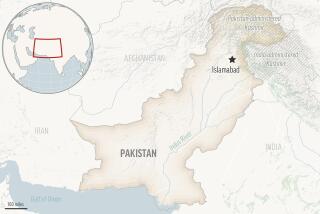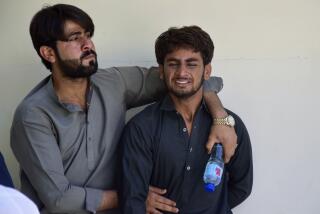Suicide blast in Pakistan kills 42
- Share via
PESHAWAR, PAKISTAN — A suicide bomber killed at least 42 people Sunday at a meeting called by tribal elders to deal with rising Taliban militancy in Pakistan’s volatile northwest, authorities said.
Dozens of people were wounded in the blast, the third in three days in the North-West Frontier Province, a rugged and largely lawless region where Pakistani security forces are waging an increasingly deadly fight against armed Taliban and Al Qaeda supporters.
The series of attacks, in which more than 80 have been killed, underscore the grave security and political challenges the country faces as the opposition parties that won parliamentary elections last month grapple with the task of forming a new government.
Hundreds of leaders representing five tribes had assembled Sunday morning on an open plain in the town of Dara Adam Khel, about 20 miles south of the provincial capital, Peshawar, to plot a strategy to combat militants in their area. Witnesses said that the gathering, known as a jirga, finished about 11 a.m., with an estimated 200 men staying behind to work out the details of a plan to establish a volunteer militia.
About half an hour later, a suicide attacker detonated his explosives in their midst, authorities said.
TV footage showed shoes, caps and blood scattered around the site of the blast. Hospitals were overwhelmed with casualties, which officials Sunday night said had reached at least 42 dead and 53 injured.
Residents identified the bomber as a teenager from Dara Adam Khel, a town known as a hotbed of illegal gun manufacturing. It was also the site of fierce fighting in January between militants and security forces, in which scores died.
The bombing was the second major attack within days to kill more than three dozen people at once. On Friday, a suicide bomber struck at a high school in the province’s scenic Swat valley where mourners had gathered for the funeral of a high-ranking police officer. At least 40 people died in that attack, which came despite official claims to have pacified the insurgency in the valley.
On Saturday, two people died in a bombing in Bajaur, also in the troubled northwest, in Pakistan’s tribal belt.
The attacks show an increasing willingness by militants to target civilians. Previously, they had directed most attacks against Pakistani police and military personnel.
The insurgency has proved one of the most intractable problems facing President Pervez Musharraf, whom the United States considers a crucial ally in the fight against Islamic extremists. Different approaches, such as open confrontation with militants and attempted peace deals, have failed to stem the rising tide of attacks, which have struck other parts of the country too, including the capital, Islamabad.
Most Pakistanis abhor the violence gripping their nation, but many are critical of the harsh military crackdown on the tribal areas, which they see as Musharraf doing the bidding of U.S. officials.
Musharraf’s allies were decisively defeated in elections Feb. 18, and the two main opposition parties have announced their intention to form a coalition government. They have also expressed dissatisfaction with Musharraf’s approach to the insurgency and hinted at intentions of changing course, but they have not spelled out how they would do so.
Musharraf has blamed Islamic militants for the assassination in December of former Prime Minister Benazir Bhutto. Her party, having won the most seats in parliament, is expected to name a prime minister soon.
--
Special correspondent Ali reported from Peshawar and Times staff writer Chu from New Delhi.
More to Read
Sign up for Essential California
The most important California stories and recommendations in your inbox every morning.
You may occasionally receive promotional content from the Los Angeles Times.














